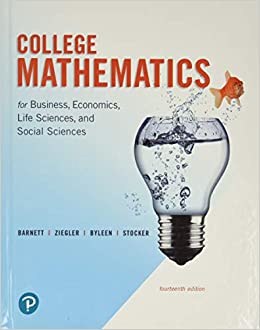Question
Why is it necessary to know about time value of money concepts? Why can?t you just make judgments about future cash flows based purely on
Why is it necessary to know about time value of money concepts? Why can?t you just make judgments about future cash flows based purely on the size of the cash flows? 2. Define Future Value. 3. Define Present Value. 4. What are annuities? 5. (calculating future value) You buy an 7 year, 8% CD for $1,000. Interest is compounded annually. How much is it worth at maturity? 6. (calculating present value) What's the present value of $10,000 to be received in 5 years? (Your required rate of return is 8% a year.) 7. (calculating the rate of return) A friend promises to pay you $600 three years from now if you loan her $500 today. What interest rate is your friend offering you? 8. (calculating the future value of an annuity) If you invest $100 a year for 20 years at 5% annual interest, how much will you have at the end of the 20th year? 9. (calculating the present value of an annuity) How much would you be willing to pay today for an investment that pays $700 a year at the end of the next 5 years? (Your required rate of return is 8% a year.) 10. (Rate of return of an annuity) You would like to have $1,000,000 40 years from now, but the most you can afford to invest each year is $1,200. What annual rate of return will you have to earn to reach your goal? 11. (Monthly compounding) If you bought a $1,000 face value CD that matured in nine months, and which was advertised as paying 6% annual interest, compounded monthly, how much would you receive when you cashed in your CD at maturity? 12. (Annualizing a monthly rate) Your credit card statement says that you will be charged 1.02% interest a month on unpaid balances. What is the Effective Annual Rate (EAR) being charged? 13. (Monthly loan payment) Best Buy has a flat-screen HDTV on sale for $1,699. If you could borrow that amount from Carl's Credit Union at 6% for 1 year, what would be your monthly loan payments? 14. (PV of a perpetuity) If your required rate of return was 12% a year, how much would you pay today for $100 a month forever? (that is, the stream of $100 monthly payments goes on forever, continuing to be paid to your heirs after your death) 15. (PV of an uneven cash flow stream) what is the PV of the following project? (Assume r = 8%) Year Cash Flow 1 $1,000 2 $2,000 3 $3,000 4 $4,000 16. (FV of an uneven cash flow stream) what is the FV at the end of year 4 of the following project? (Assume r = 8%) Year Cash Flow 1 $1,000 2 $2,000 3 $3,000 4 $4,000 Chapter 6: 17. Define the Capital Asset Pricing Model (CAPM). 18. Define ?beta? as it applies to common stocks. 19. You have two stocks in your portfolio. $30,000 is invested in a stock with a beta of 0.6 and $50,000 is invested in a stock with a beta of 1.4. What is the beta of your portfolio? 20. If the risk-free rate is 1% and the expected rate of return on the stock market is 7%, what is the required rate of return on a stock with a beta of 1.3 according to the CAPM? End of assignment questions (see answers to numerical problems on the next page) Answers to numerical problems: Question 5: $1,714 Question 6: $6,806 Question 7: 6.3% Question 8: $3,307 Question 9: $2,795 Question 10: 12.3% Question 11: $1,046 Question 12: 13.0% Question 13: $146.23 Question 14: $10,000 Question 15: $7,962 Question 16: $10,833 Question 19: 1.10 Question 20: 8.8%
Step by Step Solution
There are 3 Steps involved in it
Step: 1

Get Instant Access to Expert-Tailored Solutions
See step-by-step solutions with expert insights and AI powered tools for academic success
Step: 2

Step: 3

Ace Your Homework with AI
Get the answers you need in no time with our AI-driven, step-by-step assistance
Get Started


